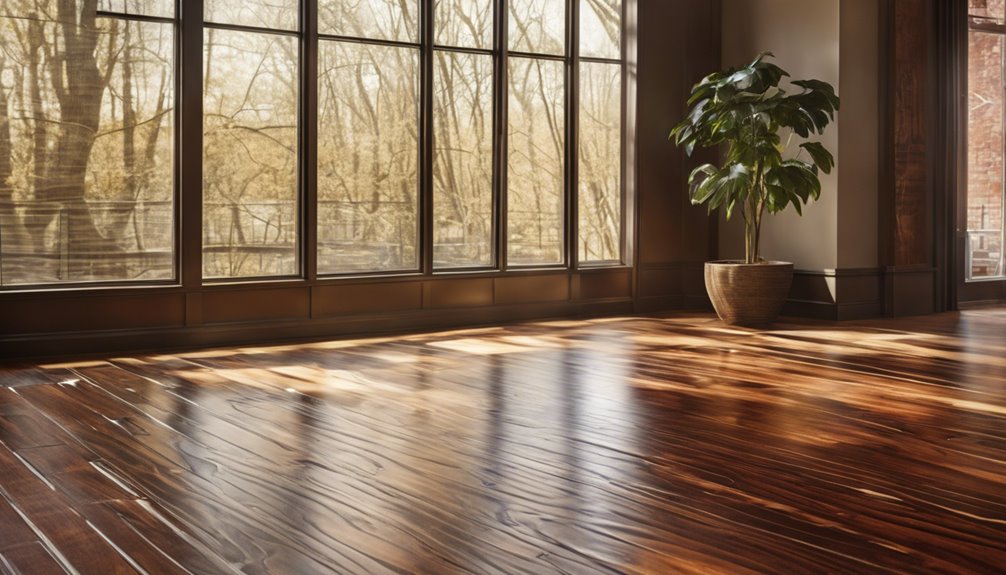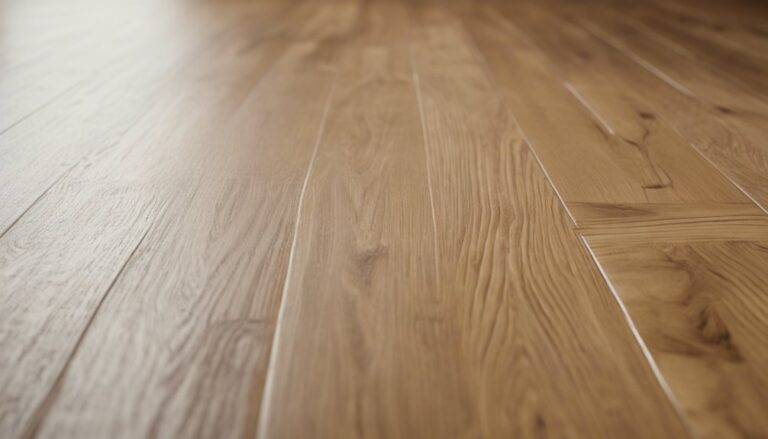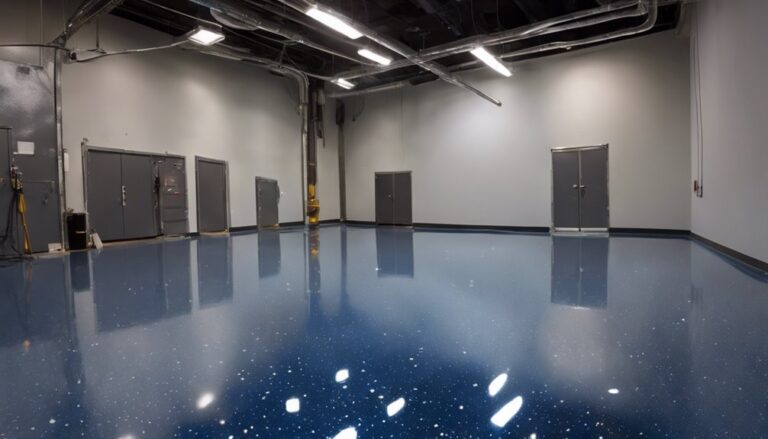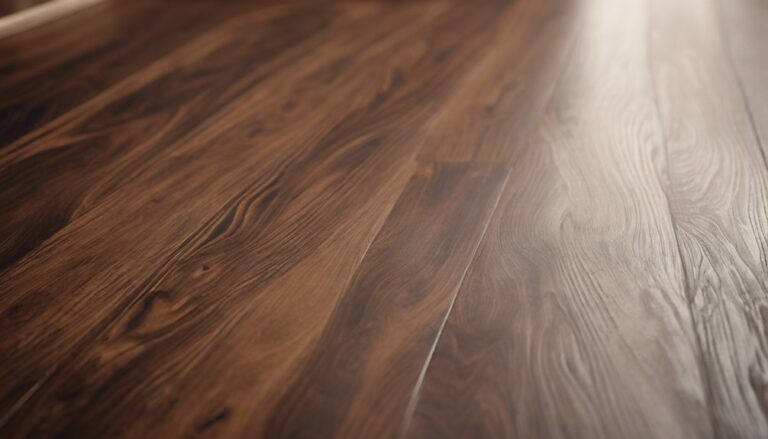Replacing hardwood floors typically costs between $5 to $12 per square foot. This range depends on several factors, such as the type of wood you choose, installation method, and complexity of the job. For instance, premium hardwoods and professional installation will push your costs higher. Don't forget to factor in additional expenses like underlayment and sealants. If you're considering a DIY approach, you might save on labor but will need to assess your skill and tools. Understanding these elements will help you budget effectively. There's more to explore about the benefits and choices available for your flooring project.
Factors Influencing Cost
When considering how much it'll cost to replace your hardwood floors, several key factors come into play. First, the type of hardwood you choose greatly impacts your cost estimation. Premium woods can be pricier, while more affordable options exist. Second, the size of the area needing replacement also affects the overall expense; larger spaces naturally require more materials and labor. Additionally, consider any flooring maintenance involved, as prep work like removing old flooring or repairing subfloors can add to your costs. Finally, local labor rates may vary, so it's wise to get multiple quotes. By understanding these factors, you'll gain better insight into what to expect financially when replacing your hardwood floors.
Types of Hardwood Flooring
When choosing hardwood flooring, you'll come across various options that cater to different needs and styles. Solid hardwood provides timeless beauty and durability, while engineered hardwood offers superior stability and easy installation. If you're looking for something unique, reclaimed wood choices add character and sustainability to your space.
Solid Hardwood Options
Although choosing the right type of solid hardwood flooring can seem overwhelming, understanding the various options available can help simplify your decision. Solid hardwood comes in different species, each offering unique characteristics. Oak, for instance, is known for its solid wood durability and prominent grain, making it a popular choice. Maple provides a smoother surface and lighter color, adding a modern touch to your space. If you're after rich color and warmth, cherry wood might be your go-to. Each type boasts solid wood aesthetics that can enhance your home's overall vibe. Consider your lifestyle and maintenance preferences, as some woods are more resistant to scratches and dents than others, ensuring your floors look great for years to come.
Engineered Hardwood Benefits
While solid hardwood flooring offers many appealing features, engineered hardwood presents a compelling alternative with its own set of advantages. One significant benefit of engineered wood is its moisture resistance, making it ideal for areas prone to humidity, like basements or kitchens. Unlike solid hardwood, which can warp or swell, engineered hardwood maintains its integrity even in fluctuating conditions. This stability allows for greater freedom in design choices, as you can install it in diverse environments. Additionally, engineered hardwood is often more budget-friendly while still delivering a beautiful aesthetic that mimics solid wood. With easy installation processes and a wide range of styles, engineered hardwood provides a practical solution for homeowners looking to enhance their spaces without compromising on quality.
Reclaimed Wood Choices
If you're looking to infuse your home with character and sustainability, reclaimed wood flooring offers a unique option. There are various reclaimed wood types, including oak, pine, and maple, each bringing its own charm and history. Using reclaimed wood not only supports eco-friendly practices but also gives your space a distinct personality that new materials can't replicate.
Reclaimed wood benefits include durability, as it's generally sourced from older, sturdier trees, and the reduced environmental impact from recycling existing materials. Plus, the unique textures and colors of reclaimed wood can create a warm, inviting atmosphere in your home. By choosing reclaimed wood flooring, you're opting for a stylish, sustainable choice that reflects your values and enhances your living space.
Installation Costs Breakdown
When it comes to replacing hardwood floors, understanding the installation costs is essential for budgeting your project effectively. The total costs can vary based on the installation methods you choose. For instance, nail-down, glue-down, and floating installations each come with their own labor rates and time commitments. You'll want to factor in the cost of skilled labor, which can range from $3 to $8 per square foot, depending on your area. Also, consider any additional expenses for flooring maintenance materials, like sealants or finishes, as these can add to the overall budget. By knowing these details, you can make informed decisions that align with your vision and financial freedom.
Additional Material Expenses
As you plan your hardwood floor replacement, it is crucial to account for additional material expenses that can greatly impact your overall budget. Beyond the cost of the flooring itself, you'll need to take into account underlayment, adhesive, and connecting strips. These additional materials can add up quickly, so it's wise to estimate their costs in advance. Don't forget about potential hidden expenses like moisture barriers or repair materials for any existing subfloor damage. If you're removing old flooring, disposal fees might also apply. To keep your project on track, create an all-inclusive list of all necessary materials and their estimated costs. This way, you'll avoid surprises and guarantee your budget allows for a smoother, more enjoyable flooring replacement experience.
DIY vs. Professional Installation
When deciding between DIY and professional installation for your hardwood floors, it's essential to weigh the cost and your skill level. While DIY can save you money, it requires a good understanding of flooring techniques and tools. Hiring a professional might come at a higher price, but their expertise can guarantee a flawless finish and save you time and potential headaches.
Cost Comparison
Replacing hardwood floors can range considerably in cost depending on whether you choose to tackle the project yourself or hire a professional. If you opt for the DIY route, you can save notably on labor costs, potentially spending between $2 to $7 per square foot for materials. However, consider the time and effort involved, as flooring maintenance can be demanding. Hiring a professional typically costs $6 to $12 per square foot, which includes installation and expertise. While this may seem higher, it guarantees quality workmanship and can prevent costly mistakes. Weighing these options carefully can help you implement effective cost-saving strategies while achieving the results you desire for your home.
Skill Level Required
Choosing between DIY and professional installation involves more than just cost; it also hinges on your skill level and comfort with home improvement projects. Conducting a skill assessment is essential before diving in. If you're contemplating DIY, evaluate whether you're familiar with the necessary installation techniques.
Here are four things to reflect on:
- Experience: Have you completed similar projects before?
- Tools: Do you have the right tools, or will you need to rent/buy them?
- Time: Can you dedicate enough time to complete the project without rush?
- Complexity: Is your flooring layout straightforward, or does it involve intricate patterns?
Weighing these factors will help you decide whether to go the DIY route or hire a pro.
Geographic Location Impact
Although you've decided to replace your hardwood floors, the cost can vary greatly based on your geographic location. Factors like regional pricing play a significant role in determining your expenses. For instance, urban areas often have higher labor and material costs compared to rural regions. Additionally, climate influence can affect the type of hardwood you choose; moist environments may require more durable materials to resist warping, while drier climates might allow for a wider range of options. Understanding these local factors will empower you to make informed decisions. Always research and compare quotes from different contractors in your area to guarantee you're getting the best deal while considering the unique challenges your location presents.
Average Cost per Square Foot
When it comes to replacing hardwood floors, the average cost per square foot typically ranges from $5 to $10, depending on various factors. You'll find that average hardwood prices can fluctuate based on:
- Quality of Material: Higher-quality wood will naturally cost more.
- Installation Complexity: Intricate designs or patterns increase labor costs.
- Geographic Location: Prices might vary considerably depending on where you live.
- Flooring Material Trends: Popular styles or eco-friendly options can impact pricing.
Long-Term Value Considerations
Investing in hardwood floor replacement isn't just about the immediate cost; it's also about the long-term value that this decision brings to your home. When you choose quality hardwood, you're enhancing your property's investment potential. Buyers often seek homes with beautiful flooring, and this can greatly boost your resale value. A well-maintained hardwood floor can last for decades, making it a practical choice for long-term living. Additionally, it creates a warm, inviting atmosphere that many people desire. This investment pays off not only in aesthetic appeal but also in potential appreciation. Ultimately, your choice in flooring can lead to greater financial freedom when you decide to sell, ensuring your home stands out in a competitive market.
Tips for Budgeting Effectively
To guarantee your hardwood floor replacement stays within budget, it's crucial to plan ahead and consider all potential costs. Implementing effective budgeting strategies can help you achieve your goal without the stress of overspending. Here are some practical tips:
- Create a Detailed Budget: List all necessary expenses, including materials, labor, and taxes.
- Use Expense Tracking Tools: Utilize apps or spreadsheets to monitor your spending as you go.
- Set a Contingency Fund: Allocate 10-15% of your budget for unexpected expenses.
- Research Costs Thoroughly: Compare prices from different suppliers to guarantee you get the best deals.
Frequently Asked Questions
Can Hardwood Floors Be Refinished Instead of Replaced?
Yes, hardwood floors can often be refinished instead of replaced, which can save you money. The refinishing costs typically range depending on the condition of your floors and the size of the area. You'll want to keep up with maintenance tips, like regular cleaning and avoiding heavy furniture on the surface, to extend the life of your refinished floors. Refinishing can bring back their original beauty and save you from a full replacement.
How Long Does Hardwood Flooring Typically Last?
So, you think your hardwood floor's invincible, huh? Well, it's durable, but it's not a superhero! Typically, hardwood flooring lasts about 25 to 30 years, depending on maintenance and traffic. Its lifespan can be extended with regular care, but neglect could lead to an early retirement. So, if you want a long-lasting relationship with your floors, treat them right and revel in their beauty for years to come!
What Are the Environmental Impacts of Hardwood Flooring?
When considering hardwood flooring, you should think about its environmental impacts. Sustainable sourcing is essential; choosing wood from responsibly managed forests can minimize deforestation. However, the carbon footprint of hardwood flooring can vary considerably based on production and transportation methods. Opting for locally sourced materials can help reduce emissions. Also, consider the lifespan of the flooring, as longer-lasting products can lessen overall environmental impact. Make informed choices that align with your values for sustainability.
Are There Any Warranties for Hardwood Flooring?
Yes, there are warranties for hardwood flooring, typically covering defects in materials and workmanship. Most manufacturers offer warranty coverage that can range from a few years to a lifetime, depending on the product. It's important to check the specific terms, as they often relate to the flooring lifespan and maintenance requirements. By understanding these warranties, you can make an informed decision, ensuring your investment in hardwood flooring pays off in the long run.
How Do I Choose the Right Wood Species for My Home?
Choosing the right wood species for your home is like picking the perfect outfit—it needs to fit your style and lifestyle. Consider factors like durability, color, and grain patterns that complement your decor. Think about installation considerations, too; some species are easier to install than others. If you've got pets or kids, opt for harder woods. Ultimately, trust your instincts and choose a species that resonates with your vision of freedom and comfort.




